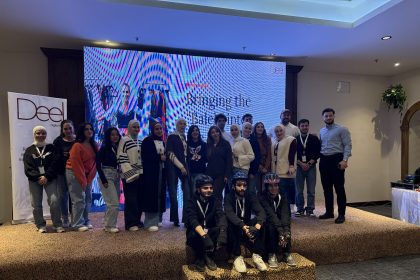Leading figures from Lebanon’s government, academic, and international communities gathered at Saint Joseph University of Beirut (USJ) for a conference titled “Social Entrepreneurship in Times of Crisis.” The event, held under the patronage of the Minister of Economy and Trade, Dr. Amer Bassat, highlighted the growing importance of impact-driven ventures in navigating the country’s complex challenges.
A New Economic Paradigm For Lebanon
In his opening remarks, Minister Bassat emphasized the potential of the social economy to blend the efficiency of the private sector with the compassion of the non-profit world. He noted its power to create jobs, particularly in rural areas, and strengthen community bonds.
“The social economy is a cornerstone in this field,” Bassat stated, adding, “The Lebanese have a natural ability to devise innovative ideas, generate revenue, and build social economy chains.” He also acknowledged the European Union’s crucial role in supporting private sector development and innovation in the country.
This sentiment was echoed by Alessandra Viezzer, Head of Cooperation at the EU Delegation to Lebanon, who confirmed continued support through the Erasmus+ program. Viezzer strongly urged the Lebanese government to formalize its commitment, stating, “I encourage the government to take steps to adopt and enact the social economy law. A regulated framework is needed to promote and support the social economy.”
Crisis As A Catalyst For Innovation
Professor Fouad Zmokhol, Dean of the Faculty of Business Administration at USJ, framed the country’s persistent challenges not as obstacles, but as drivers of ingenuity. “Our goal is to solve problems in times of crisis, where social cohesion becomes critically important. Crises have become a catalyst for innovation,” he explained.
Zmokhol pointed to the emergence of impactful startups and NGOs from within the university’s community, tackling critical issues in waste management, agri-tech, education, and health. He proposed a revised business ethos focused on three pillars: “People, Cohesion, and Profit.”
“Profit can disappear over time, so social cohesion must leave a lasting impact,” Zmokhol argued. “It is not enough that we do well; we must all do good.”
Professor Salim Daccache, Rector of USJ, reinforced this view, describing the conference as “a collective action that inspires hope and supports the Lebanese community.” He clarified, “Social economy is not charity; it is a new form of citizenship.”
From Theory To Practice
The conference featured three practical workshops that brought together legal experts, sustainability advocates, and active social entrepreneurs.
The first workshop addressed the legal framework for social enterprises in Lebanon. The second focused on integrating the UN’s Sustainable Development Goals (SDGs) into core business activities.
The final workshop, “Social Entrepreneurs in Action – Successes and Challenges,” showcased the work of prominent impact leaders from organizations including arc-en-ciel, Cedar Environmental, Berytech, and ProAbled, offering real-world insights into the opportunities and hurdles facing the sector.
About Saint Joseph University of Beirut
Founded in 1875, Saint Joseph University of Beirut (USJ) is a private Lebanese university renowned for its excellence in higher education and research. It plays a significant role in the academic and cultural landscape of Lebanon and the wider MENA region, offering a wide range of programs across multiple faculties and campuses.
Source: NNA Lebanon















